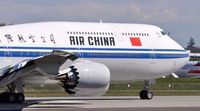On May 6, 2025, China experienced a remarkable surge in both domestic and international tourism during the Labor Day holiday, showcasing the country's growing appetite for travel and cultural experiences. A report from the popular social media platform WeChat highlighted a 37% increase in duty-free transactions through the app for outbound travel compared to the previous year. This uptick reflects a broader trend of rising cross-border consumption and tourism, with foreign tourists also increasing their spending in China.
During the holiday, cities like Shanghai, Guangzhou, and Beijing emerged as the top three destinations for domestic travelers, followed closely by Chengdu and Chongqing. The vibrant consumer landscape was evident, particularly in the hospitality and transportation sectors. Notably, the number of high-speed train ticket purchases rose by over 10% month-on-month, indicating a robust demand for travel within China.
In the food and beverage sector, restaurant transactions increased by 12% year-on-year, with local brands such as Meishi Huayuan and Lakin Coffee gaining popularity among consumers. This trend underscores a shift towards supporting domestic businesses and enjoying unique culinary experiences.
Interestingly, the integration of social media and consumption patterns has become more pronounced. The average number of short travel-related video views on Consumer Accounts surged by 29%, while WeChat store orders saw a staggering 62% increase compared to the previous year. This shift illustrates how digital platforms are reshaping the way people engage with travel and leisure activities.
Moreover, the demand for luxury items also spiked, with jewelry gift orders soaring by 160% month-on-month. This trend highlights a cultural shift towards using gifts as a means of expression and celebration during the holiday season.
As for outbound tourism, destinations like Hong Kong, Macao, Japan, South Korea, and Southeast Asia have become increasingly favored by Chinese tourists. The ease of access and diverse cultural experiences offered by these locations are major draws. For instance, the mutual visa exemption agreement between China and Malaysia resulted in a remarkable 200% increase in visits to Malaysian small group tours, while South Korea enjoyed a 50% rise in WeChat Pay transactions.
In Hong Kong and Macao, mobile payment systems have become deeply integrated into daily life, facilitating a seamless experience for tourists. Remarkably, outbound travel bookings via WeChat for car rentals in Hong Kong skyrocketed by 643%. Additionally, the introduction of a new "red envelope cover" feature, allowing for more personalized metro access through facial recognition, helped boost WeChat Pay transactions by 55% during the Labor Day holiday.
Data also revealed a significant increase in the number of Hong Kong residents traveling to the mainland during the holiday, with their consumption in mainland China doubling compared to the same period last year. There was a notable interest in trendy tea drinks and modern toys, indicating evolving consumer preferences.
Moreover, the interest in short-distance travel has expanded, with cities like Tianjin, Hangzhou, and Chengdu gaining traction among travelers. Visitors from Hong Kong have started to establish local food stalls, further enriching the culinary landscape.
Analysts believe that the strong demand for cultural tourism during the Labor Day holiday not only compensates for previous downturns in the sector but also highlights the essential role of digital tools in facilitating cross-border consumption. This momentum suggests a vibrant and expansive future for China's tourism market.
On the stock market front, shares of Chinese airlines saw a significant boost on May 7, 2025, driven by the resurgence in domestic travel and a drop in global oil prices following OPEC+'s decision to increase production. The travel service provider Trip.com reported a staggering 130% increase in domestic air travel bookings during the five-day holiday compared to the previous year, signaling a strong recovery in the aviation sector.
With oil prices hitting their lowest levels in years after OPEC+'s announcement to add 411,000 barrels per day in June, the combined effect of rising travel demand and lower fuel costs has positively impacted airline stocks. Among the notable gains, China Southern Airlines shares rose by 4.3% to 5.8500 yuan, while Air China shares increased by nearly 7% to 4.9700 Hong Kong dollars. China Eastern Airlines also saw a 7.3% rise in its stock value.
As the Labor Day holiday showcased a thriving tourism sector, it is clear that the combination of increasing consumer confidence, digital innovation, and favorable economic conditions is paving the way for a robust future in China's travel and tourism industry.





